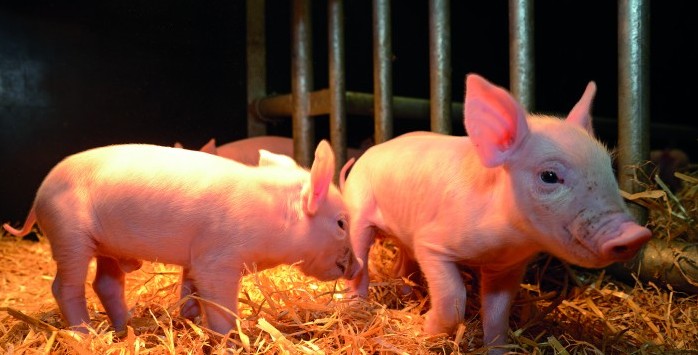The Roslin Institute and Genus have signed an agreement to produce pigs using gene editing technology that are resistant to Porcine Reproductive and Respiratory Syndrome.
The Roslin researchers and the global animal genetics company hope the licensing agreement will lead the way to gene-edited, disease-resistant pigs being available to global pork-producing markets.
With the signing of the agreement, facilitated by Edinburgh Innovations, the University’s commercialisation service, Genus will continue planned work for testing multiple generations of pigs and conducting studies required for approval by the US Food and Drug Administration (FDA).
PRRS is a respiratory disease which causes breathing problems and deaths in young animals and can result in pregnant sows losing their litters. It costs the industry around $2.5 billion each year in the US and Europe alone.
Vaccines have mostly failed to stop the spread of the virus that causes PRRS, which is endemic in most pig-producing countries worldwide.
The Roslin Institute has already produced pigs that can resist the disease by editing their genetic code through research, which received funding from Genus and the Biotechnology and Biological Sciences Research Council.
The process of getting the technology approved on the EU and UK markets will not straightforward as gene editing is currently covered by the same regulations as genetically modified organisms (GMOs), making it almost impossible to get approval.
However, Defra Secretary George Eustice launched a consultation at the start of this year on changing the laws in England to make it easier for plants and animals produced by gene editing to be approved for use on farms.
Regulatory regimes are more accepting of the technology in other parts of the world.
Project leaders said that by partnering with Genus, the institute will benefit from its existing relationship with the US Food and Drink Administration, insights into the pork sector, its established supply chain, and its distribution channels in the world’s biggest pig markets, including China, Europe and the US.
Dr John Lonsdale, head of enterprise at Edinburgh Innovations, said: “This highly specific edit to the animals to ensure disease resistance is a result of decades of work at Roslin, and we’re delighted to be helping to improve animal welfare by bringing this technological breakthrough to market through this partnership with Genus.”
Professor Bruce Whitelaw, interim director of the Roslin Institute and Dean of Innovation at the University’s College of Medicine and Veterinary Medicine, said the institute, which famously produced the first cloned mammal, Dolly the Sheep, in 1996, is recognised for pioneering animal biotechnology that enables genetic engineering of farmed animals. This is reinforced by its partnership with Genus, which is enabling to transfer academic work into useful projects for the livestock sector, he added.
Dr Elena Rice, chief scientific officer at Genus PLC, said: “We have long and fruitful relationships with Roslin and admire the depth of Roslin’s research and pioneering spirit. Together we laid out the groundwork for combating PRRS, and Genus is working with the FDA to obtain approval for this technology.”




